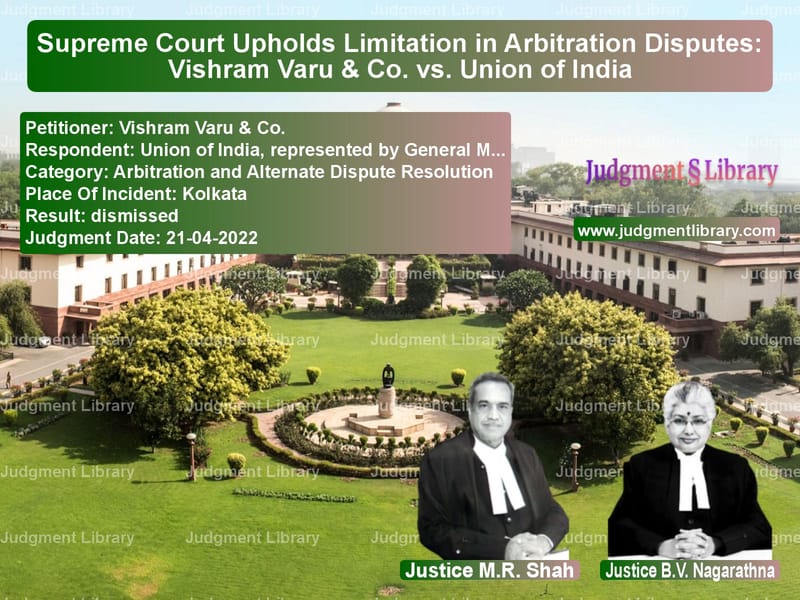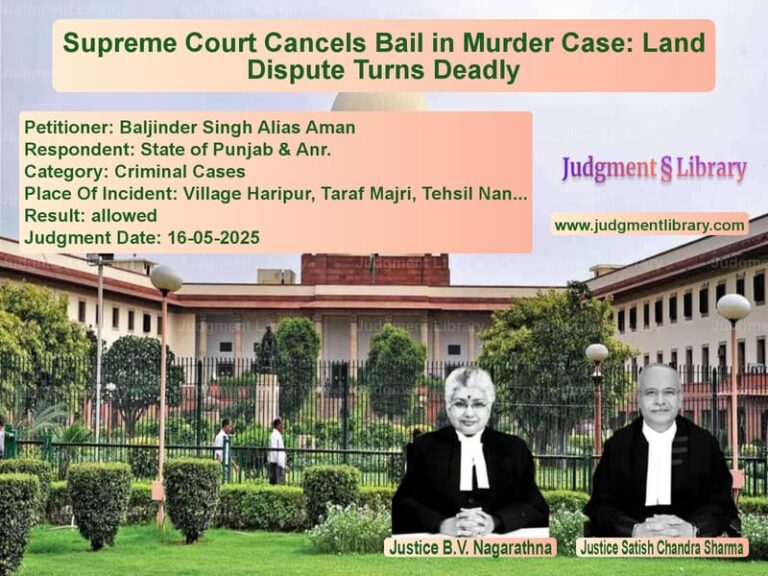Supreme Court Upholds Limitation in Arbitration Disputes: Vishram Varu & Co. vs. Union of India
The Supreme Court of India, in the case of Vishram Varu & Co. vs. Union of India, delivered an important ruling on limitation in arbitration proceedings. The judgment, which upheld the decision of the Calcutta High Court, clarifies the timeframe within which arbitration claims can be initiated under the Arbitration and Conciliation Act, 1996. This ruling provides significant legal clarity on the rights of parties seeking arbitration long after their contractual obligations have ended.
Background of the Case
The appellant, Vishram Varu & Co., was issued a work order in 1982 by the South Eastern Railway. The work was completed in 1986. The appellant claimed that it had executed work beyond the agreed quantity and was entitled to additional payment.
Despite multiple correspondences over the years, the appellant alleged that the payment for the excess work was never made. The firm sent a formal request on May 31, 2018, to the General Manager of South Eastern Railway, seeking either payment of the dues or referral to arbitration under Clauses 63 & 64 of the General Conditions of Contract (GCC). However, the railway authorities took no action.
Subsequently, the appellant sent repeated requests:
- October 22, 2018 – Request to release overdue payments or refer to arbitration.
- January 11, 2019 – Further reminder.
- March 11, 2019 – Final reminder.
When no arbitrator was appointed, the appellant filed an application under Section 11(6) of the Arbitration and Conciliation Act, 1996, before the Calcutta High Court, seeking the appointment of an arbitrator.
High Court’s Decision
The Calcutta High Court dismissed the arbitration petition on March 19, 2021, ruling that the claim was barred by limitation. The appellant then approached the Supreme Court.
Supreme Court’s Judgment
Key Arguments by the Appellant
- The appellant argued that the limitation period for filing an arbitration petition should be calculated from the date the legal notice invoking arbitration was served (July 31, 2019), rather than from the completion of the work (1986).
- It cited the Supreme Court’s ruling in Bharat Sanchar Nigam Ltd. v. Nortel Networks India Pvt. Ltd., which held that the limitation period for filing an arbitration application falls under Article 137 of the Limitation Act, 1963, and is three years from the date when the right to apply accrues.
- The appellant contended that since the arbitration clause was formally invoked in 2019, the limitation should be counted from that date.
Key Observations by the Supreme Court
- The Court noted that the work was completed in 1986, meaning that any claim regarding payments should have been raised soon after.
- The appellant waited over 32 years before invoking the arbitration clause, which was an unreasonable delay.
- Repeated correspondences or RTI applications from 2012 onwards do not extend the limitation period.
- The Court clarified that while the Limitation Act applies to arbitration cases, the right to apply for arbitration must be exercised within a reasonable period from the accrual of the cause of action.
Final Decision
The Supreme Court dismissed the appeal, upholding the High Court’s decision. The key takeaway from the ruling is:
“Merely serving a legal notice invoking arbitration after an inordinate delay does not revive a stale claim. Limitation begins when the cause of action arises, not when a party chooses to initiate arbitration.”
Implications of the Judgment
For Arbitration Proceedings
- The judgment reinforces the principle that limitation laws apply strictly to arbitration.
- Parties seeking arbitration should act promptly and not wait decades before invoking an arbitration clause.
For Government Contractors
- Firms executing government contracts must ensure that payment disputes are resolved in a timely manner.
- Long-dormant claims cannot be revived merely by sending legal notices decades later.
For Future Legal Precedents
- The ruling clarifies that correspondences and legal notices do not extend limitation indefinitely.
- It establishes that claims arising from government contracts must be pursued without unreasonable delay.
Conclusion
The Supreme Court’s judgment in Vishram Varu & Co. vs. Union of India sets an important precedent for arbitration in India. By strictly enforcing limitation rules, the Court has ensured that parties cannot indefinitely delay arbitration proceedings. This ruling will serve as a strong reminder that claims must be pursued within a reasonable timeframe to avoid dismissal on limitation grounds.
Petitioner Name: Vishram Varu & Co..Respondent Name: Union of India, represented by General Manager, South Eastern Railway, Kolkata.Judgment By: Justice M.R. Shah, Justice B.V. Nagarathna.Place Of Incident: Kolkata.Judgment Date: 21-04-2022.
Don’t miss out on the full details! Download the complete judgment in PDF format below and gain valuable insights instantly!
Download Judgment: vishram-varu-&-co.-vs-union-of-india,-repr-supreme-court-of-india-judgment-dated-21-04-2022.pdf
Directly Download Judgment: Directly download this Judgment
See all petitions in Arbitration Act
See all petitions in Contract Disputes
See all petitions in Dispute Resolution Mechanisms
See all petitions in Judgment by Mukeshkumar Rasikbhai Shah
See all petitions in Judgment by B.V. Nagarathna
See all petitions in dismissed
See all petitions in supreme court of India judgments April 2022
See all petitions in 2022 judgments
See all posts in Arbitration and Alternate Dispute Resolution Category
See all allowed petitions in Arbitration and Alternate Dispute Resolution Category
See all Dismissed petitions in Arbitration and Alternate Dispute Resolution Category
See all partially allowed petitions in Arbitration and Alternate Dispute Resolution Category







